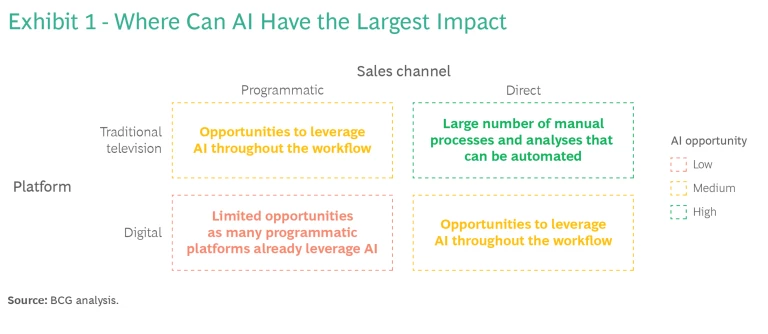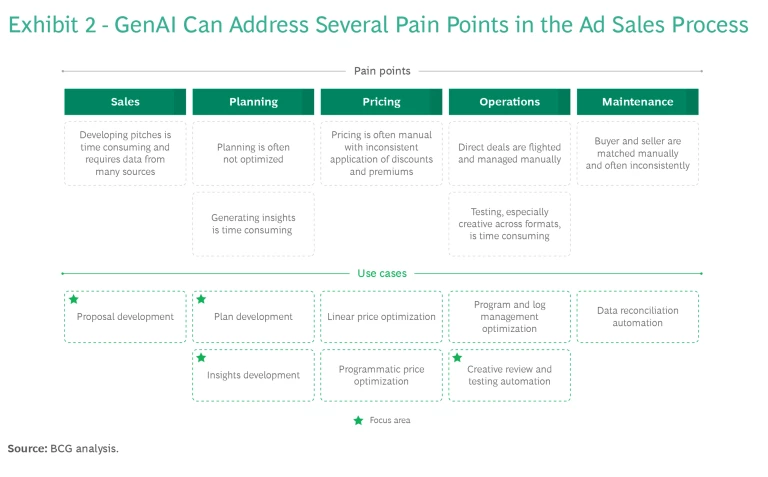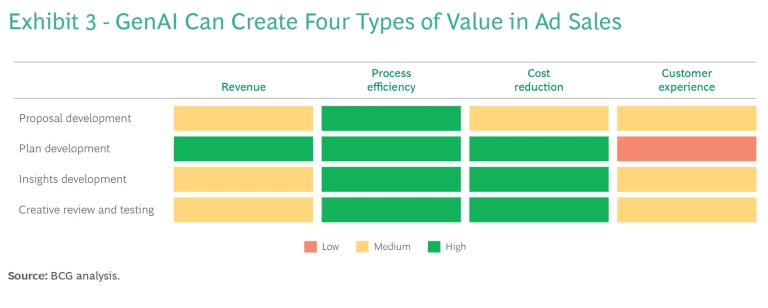Chief marketing officers, ad agencies, and others on the buy side are embracing generative and other forms of AI. The sales teams of traditional media companies, however, have been slower to adopt these tools.
The So What
The sales teams of traditional media companies have an opportunity to implement AI tools to help generate ad revenue and improve the level of client support and campaign customization.
A recent survey of 200 chief marketing officers conducted by BCG revealed that:
- 70% have already adopted some form of generative AI.
- 84% plan to launch products and services powered by AI.
Brands and agencies are adopting generative AI to become more efficient and effective. Their ability to generate content more easily, for example, will translate to a higher degree of personalization and greater number of campaigns.
By contrast, the ad sales teams of many media organizations are still evaluating generative AI and its potential. Executives cite several reasons for the delay, notably a backlog of digital distribution and monetization initiatives and a concern over how to get started with AI. Fortunately, there are steps organizations can take to help accelerate their transformations.
The Backdrop
Generative AI is clearly in the “hype cycle” due to new releases of ChatGPT, Bard, and other solutions, but media organizations should consider the full portfolio of AI capabilities available to improve workflows and business processes:
- Robotic process automation, which automates simple, manual processes such as invoice processing and data entry, can be implemented with basic training.
- Traditional AI and machine learning excels at such tasks as dynamic pricing, demand forecasting, and plan optimization but requires proprietary data and engineers with specific experience.
- Generative AI is well suited for creative tasks such as developing content, customer chatbots, and creating video ads. Like traditional AI, it can require customization to address an organization’s specific needs.
Now What
Companies need a structured approach to bring AI to scale. And they must bring teams along the transformation journey. Here are three steps to follow:

Understand your workflows. Before they transform, media companies need to identify workflows and sales channels that would benefit the most from increased automation, optimization, and content creation capabilities. For broadcasters and cable programmers, for example, automating direct sold traditional TV campaigns—with their manual processes, ad-hoc analyses, and significant revenue contribution—is ripe for AI and automation. (See Exhibit 1.)
Generally, most media companies will want to focus on teams supporting the direct sale and delivery of campaigns rather than support functions such as HR, legal, and customer. The teams supporting sales, planning, and operations generally are the largest in ad sales and so are promising places to seek efficiencies through generative AI.

Identify pain points. AI excels at solving frictions and process bottlenecks. Exhibit 2 shows four of the main common pain points:
- Proposal Development. In most media organizations, responses to RFPs are manually generated by analyzing proprietary data and market research to address agency questions. Instead, generative AI models, customized with proprietary and licensed third-party data, can analyze historical data, and identify client KPIs to incorporate into materials.
- Plan Development. Most plans are manually created based on forecasts, commitments, and other inputs. It is difficult to ensure yield is optimized across plans and the broader portfolio. Instead, AI and machine learning tools can optimize plans by analyzing buying based on past business cycles and running scenarios that take into account proposal requirements, available inventory, and previous commitments.
- Insights Development. As with proposal development, insights are often manually generated by aggregating and analyzing a common set of data. It can take days to produce a single campaign for one client. Instead, customized generative AI models can quickly create reports, allowing executives to spend more time thinking about the strategic implications.
- Creative Review and Testing. Media organizations need to review, test, and approve many forms of creative outputs delivered to many distribution outlets, a process often managed by third parties. Instead, AI tools can create assets and execute creative reviews to decrease human interaction.
Overcome resistance. Teams can sometimes resist the adoption of AI on the grounds that it cannot execute a sales team’s activities. That belief is only partly true. AI may not yet help with strategic tasks such as developing the pricing strategy but is fully capable of taking on more tactical tasks such as demand forecasting and calculating premiums and discounts.
Media companies can overcome employee resistance by decomposing work into tactical, operational, and strategic activities. This approach also helps diffuse potential pushback by recognizing some use cases and activities are not good candidates for AI.
Establish priorities. All use cases are not created equal. Media companies should start with those that are feasible in the near-term and provide high benefit in the long term.
When thinking about feasibility consider:
- Does the organization have access to the necessary AI capabilities?
- Can the use case be launched in a reasonable period?
- Is the necessary data available?
- Is the organization ready to adopt the new approach?
Likewise, there are many ways to evaluate the benefit, or potential, of a use case:
- What is the potential revenue and contribution margin?
- How will the business process become more efficient?
- How will direct costs be affected? How quickly?
- Will the initiative improve the brand or customer experience or both?
In our experience, plan automation and creative review and testing are likely to yield the most benefit across the four dimensions of potential. But media companies should analyze their own operations to be sure. (See Exhibit 3.)

Get started. For many ad sales executives, generative AI can understandably seem daunting in face of other challenges. But inaction is not an option. Start with high-value short-term uses cases that can quickly demonstrate value before moving on to more ambitious cases. The opportunity to lower costs, improve efficiency, and provide customers a higher level of service should be cause for action and even optimism.






